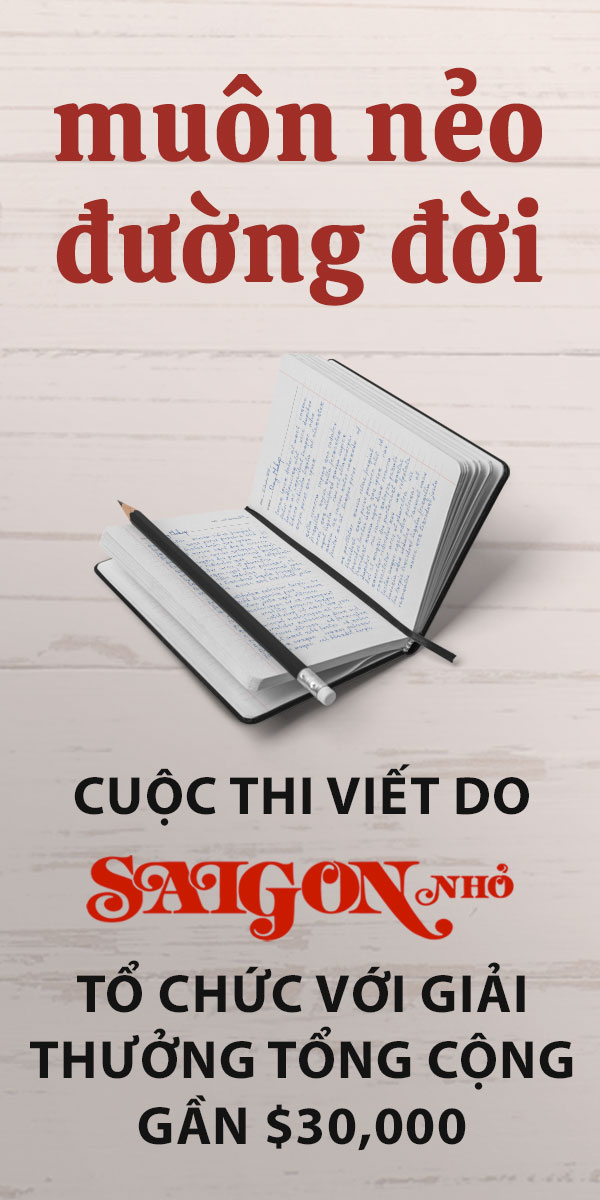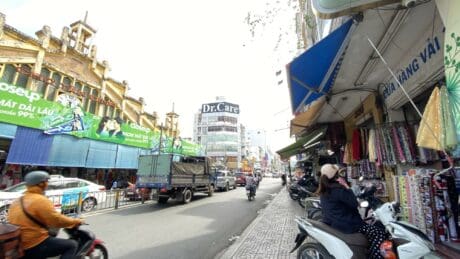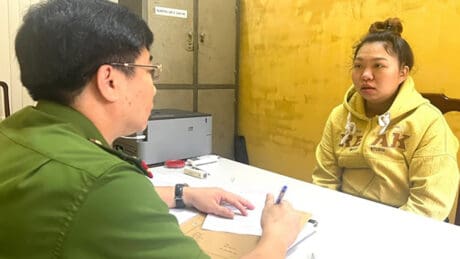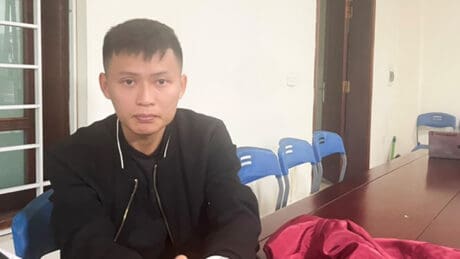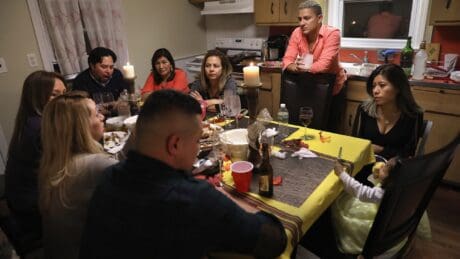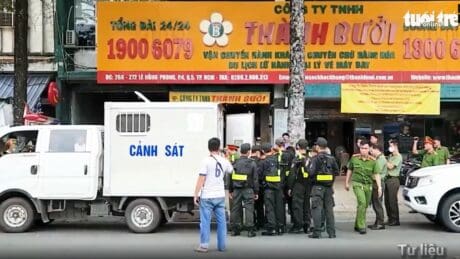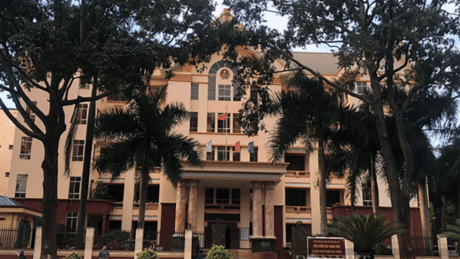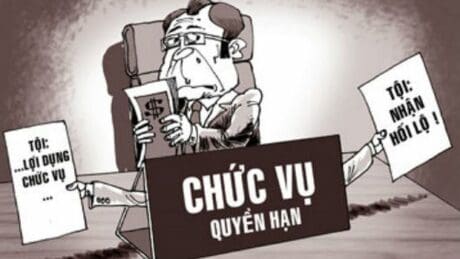Part 1: Leaving
After years of yearning and months of planning, the day to go finally came. I smiled but tears came to my eyes, seeing Mary, my neighbor, a self-professed “retiree-extraordinaire”, standing with her well wishes sign. I embraced the septuagenarian, deeply moved that she woke up so early to see me off. I carefully placed her homemade sign by the potted hoya (a life force talisman to guard against homesickness) in the backseat and began the long drive to begin my doctoral education.
Cathy, my former professor and now colleague must have sensed my trepidation, offered her company and moral support. She offered to help drive so that I could relax and enjoy the scenic views of picturesque lakes, lush mountains, and enchanting carpets of wildflowers on either side of the highway. Despite her amiable chatter, I could not shake the sense of unease, confusion and guilt as the conversation I had had with my mother repeated in my mind.

The cradle of learning
“Cá không ăn muối cá ươn/Con cãi cha mẹ trăm đường con hư”
(Fish not marinated in salt will rot/a child not heeding her parents’ words will spoil in a hundred ways).
A few weeks earlier, I had driven home to visit my mother and shared my wishes and educational plan. In the beginning, I would be away from home for two and a half summers for coursework, living in the college dormitory. My mother had shaken her head. Her beautiful eyes gazed at me in bewilderment. I knew that I had perturbed her and saw that she was decidedly unhappy. Ever gentle in her speech, yet her words cut at me, “You have a life of comfort, a nice family with your husband and daughters…Why are you leaving them? What are you doing?” I mentioned that I have had lengthy conversations with my husband and children and that pursuing higher education was important and beneficial for us all. It was my dream to pursue a doctorate. No matter! It was clear to me that my mother thought I was being reckless and irresponsible.
It was confusing to me because my parents had impressed the value of education on us as children, that they took many risks to immigrate to the United States for our educational endeavors. They had implied that our future depended solely on education and hard work. This narrative told repeatedly, easily rolled off the tongue like countless tales from thousands of other immigrants. I had heard my mother recount my love for school hundreds of times. Depending on context, I had seen a swift glint of surprised amazement and perhaps pride in her eyes, even though her narrative was dampened by worries that I was “too itty bitty” therefore they held me back from first grade. Or that period in our lives when there was no money or food in the house, and she couldn’t give me a meal before going to class.
Although my mother did not get formal education beyond elementary school, she had been my first teacher. My whole life, I have learned from her not only what to do but how to do it with grace. I observed the intricacies of interpersonal interactions and exquisite standards of care in her interactions with relatives, neighbors, and customers. She showed me how important it was to treat others well. I learned, “Tiên học lễ, hậu học văn”, that before accumulating knowledge, it was first necessary to learn manners and morals well.
She taught me to read. An early memory I hold close to my heart: my mother sits peeling yucca roots to make yucca flour, me sitting in her lap sounding out vowels, dusk darkening everything around us. She taught me about life and how to live through the teachings of proverbs and parables. I had a sense that the wisdom she imparted was from the lived experiences of our ancestors, passed down from generations before us. Through the parables and proverbs, she helped me to read between the lines. I loved the sinewy turns of the words, the interlocking parallels of images and metaphors, compelling stories and all that wisdom in our ancient cultural heritage. So, with a childish sense of wonderment, my desire to learn only grew more insistent. I was always curious. “Curiosity kills the cat” be damned! I wonder if it was because I sat in her lap learning to read, I have found inviolable joy in reading and learning intermixed with the warmth and love in the sacred cocoon of my mother’s containing sphere.
I learned to play with words. I also learned to question and think critically. Once, in high school, I brought up the proverb, “Áo mặc sao qua khỏi đầu” (a shirt is not worn over the head), its lesson insisting that children do not know better than the parents. I mentioned that this proverb is wrong now since we have pullover sweaters and T-shirts that required pulling over the head. I recognized myself, forever a child and being too literal. She swatted my hand, “yes, the little Miss is so educated she knows better now!”
I was sure that our culture would not sanction any backtalk! Heeding her reproach, I squeezed her hand, said I was teasing and tried to connect that with time and situational circumstances, there were changes, new knowledge, and different points of view or perspectives. Indeed, our ancestors’ clothing only included button-down shirts, or tops that wrapped around and tied in the back… Of course, I knew in our choices, often, choosing something new means rejecting something old; going away means leaving something behind. Sadly, I did not have the words or knew how to navigate our conversations regarding generational divides and tensions.
Leaving and staying – the distance between us
“Đi cho biết đó biết đây/Ở nhà với mẹ, biết ngày nào khôn”
(Travel to know places and people/a child will not grow wise if only staying home with mom.)
My driving companion, an alumna of this graduate program, happily talked about the curriculum and shared her fond memories. I shared my anxieties about whether I was good enough academically to be in this prestigious program. At the time, I did not even know that impostor syndrome was “par for the course” for graduate students and that I did not have to be ashamed of my sense of inadequacies. How could anyone know how to do well things they have not been taught or experienced? Gee, I even worried excessively about living in the dorm for the first time, sharing the communal showers and bathrooms with people in their twenties.
We had only lived in the United States for 3 years when I began to apply to college for my bachelor’s degree. My parents were adamant that I not go away to college. Beyond cost, they did not want me straying away from the protective home. Perhaps, they were afraid that I could not make it on my own. They had no idea about the world of colleges and universities; they did not know what to do and how to access information or financial support. I was able to win a partial scholarship to a private Jesuit liberal arts college in town, allowing me to stay home but not attend the same university as my two brothers. Matriculation Mass and Orientation was on a Friday.
My parents were working, so I went alone. I will never forget the experience of being “in over my head” when I found myself sitting down to the catered white-tablecloth-luncheon with my prospective classmates and their parents. I had no idea which of the 4 different glasses and forks and spoons to use. Instinctively, I remembered my mother’s instructions: “pay attention”, “watch and learn.” I focused on watching and mimicking while trying to not give in to despair, fear, and a sense of sad forlornness not having my parents by me like the other kids. Yet, I knew not to complain. I wanted to go my way, to be at this school rather than be at the university where my brothers and other Vietnamese students in my high school class were attending. This is the risk of striking out, daring to go on a different path…
– “Where is this hotel? Are you sure it was a good place?” Cathy said. The note of urgency in her voice pulled me out of my reverie in the past.
I had booked the hotel in Schenectady, New York to break up our long drive. Night was descending over the land. The roads were enveloped in darkness. My fear awakened as our drive wound through a dilapidated area; scattered streetlights showed forsaken buildings with boarded-up windows. “The pictures on the hotel’s website looked fine and comfortable,” I answered her vaguely. I was too self-conscious to disclose the reason I had picked a hotel in Schenectady as opposed to any other cities on our journey; it was the only city with a name I was familiar with, having read it in Henry James’ Daisy Miller.
The momentary panic passed. We found the hotel. It was tidy and respectable. The beds promised a good night rest. The thick brocade curtains blocked out all the light yet I could not sleep. I tossed and turned, held awake by the weight of terror over what I have done. The sound of alarm in Cathy’s voice earlier brought a realization into sharp focus: the risks of going into unknown territories have dangerous consequences not just to me, but also, because of my ambitious desires and impetuous actions, for others I loved.

We arrived at the school around 11am, on time for check-in. Cathy helped me to move in, wiped down the desk, bookcase, and made the twin bed. We would go to Target later in search of a little end table. Right after Cathy left to meet a friend for lunch, Mom called. Like always, with no preamble, she asked casually, “What are you doing?” I wondered if she had forgotten about today and what it meant for me.
– “I just moved into the dorm and just finished putting the room together.”
– “Why? Why are you doing this to your family?” I could envision her shaking her head.
I answered plaintively to her questions, “Why do you never support what I wanted to do? I miss Dad. At least he was always encouraging me to study, to ‘go for it’.” I felt choked up, tears threatening to pour so I hastily asked to end the call, “I have to go to a class meeting at 1pm, Mom. I can’t talk more… I have to go now…”
So, I left that conversation and we have never really talked about it all these years later. In that conversation with my mother, I felt unsupported by her, but I also wounded her. In my drive to pursue my “pie in the sky” dream, I left her questions unanswered and left her – the distance between us widened further. How do I explain to her that maybe this was my quest, to seek answers for myself, and answers to her questions?
Part 2: Re-membering
Western literature is full of tales of the hero’s journey. East Asians have many tales and folklores about the hero’s journey, the quest for knowledge, too. Yet in both Eastern and Western traditions, the narrative arc follows the gender divide: the male protagonist leaves home, and the female protagonist’s story is situated at home. Confucian philosophy dictated the female follow the three rules of obedience in her lifetime, “Serve her father, serve her husband, serve her son.” Vietnamese folklore highlights the wife’s loyalty and sacrifice in the lore of “Hòn Vọng Phu” or “the lady of Nam Xương.” Perhaps, women and girls are not meant to leave the home. What I was doing might be both personal and cultural transgressions.
The many journeys
My parents and I are refugees and immigrants – venturing out is not new. After 1975, their lives changed dramatically. My father had been despondent, so it was Mom who adapted and maneuvered the family with different ventures: making yucca flour, buying and selling fruits, operating a snack stand, selling different tasty foods to allow us to live in the post “liberated Vietnam” years. She even navigated pacifying the local officials with bribes to keep Dad out of jail for all the times he went on his many tirades about “evil Communists.”
A most surprising fact I learned about Mom was that her father was in the resistance with the Việt Minh and the Communists. He would go into the jungle, and she would be home with her stepmother. For reasons unknown to my mother, while her biological mother was alive and lived in the town, they were estranged. The proverb “Mồ côi cha ăn cơm với cá, mồ côi mẹ liếm lá đầu đường” (orphaned father, the child still eats rice and fish, orphaned mother, the child licks leaves on the street) sadly described my mother’s childhood well. I learned that when not yet 20, Mom ran away from home for Đà Nẵng, the nearby large city to work and built a life on her own.
Unlike Mom, Dad was well-loved. I heard that my paternal grandmother, widowed, lived for her only son. He was a dreamer. He was always full of ideals and ideas. After the war ended, Dad worked as a welder. He tried to keep up with his mechanic shop intermittently. After 1975, they tried different trades, trader and merchant of wood, rice, yucca, and banana to eke out a living. Once, on their trip upstream to purchase goods, they had taken all the boys, including P., my younger brother, who was not yet a year old at the time. Their boat capsized and they lost all the goods and money, yet they were grateful to keep their lives.
Many nights, under the moonlight, Dad and his friends would gather to drink. They sang, “Hiu hiu gió thổi đầu non/Mấy thằng uống rượu là con Ngọc Hoàng” (Gently the breeze flows on the mount/Drinking men are Emperor Jade’s children.) I would hear them trade stories about bygone golden days, and about gold paved streets in America. My Dad talked incessantly about America. He went on many trips to “vượt biển” (cross ocean), to leave the country, only to fail miserably. I learned about this when I was 18. One day, one of my brothers cautioned, “That guy, T., seems to come around here for you a lot. Dad would never approve of him, given his Huế accent.” Why? Among those many trips to leave the country, my father was swindled and lost substantial money to a man with a Huế accent. Betrayed and traumatized, he generated and transferred that anger and distrust on all men with a Huế accent. Looking back, I wondered how much money Mom struggled to make and save in her laborious ventures for it to be washed away by Dad’s many “best laid plans.”
I knew I was being a brat and hurt my mother’s feelings when I suggested that Dad had always been more encouraging and supportive than she. I recognize I was “canonizing” him, seeing the dead only in good light. I am the only daughter among 7 sons, so Dad was often indulgent to me, but he was not always supportive. When I began college, he had high hopes that I would become a doctor or an engineer or a businesswoman to ensure wealth and prestige. In my junior year of college, firmly pursuing double majors in the liberal arts, my father was so disappointed and angry at me that he stopped inquiring about my schooling, stopped talking about world events or really anything substantial with me. It was as if I killed his hopes and dreams and failed him. To him, I was disobedient and spoiled! I felt bereft and set adrift. I finished college, eventually moved away following my marriage. It is among my great sadnesses that my father and I never got to talk through this before his death.
Lessons learned
“Đi một ngày đàng học một sàng khôn”
(Much wisdom is gained in a day’s journey out)
In my doctoral program, I was learning many new theories and philosophies and research in the production of knowledge. I learned many theories about human development and interactions. Margaret Mahler, a Hungarian American psychoanalyst described the child’s process of separation and individuation. She observed that around toddlerhood, the child will leave the safety of mother’s lap to explore her environment but will also return to mom for support in the developmental journey. In the United States, children were expected to grow up, and “move out” at a certain age as a marker of independence and adulthood. In many Vietnamese households, often, multiple generations could live in the same house. When I was growing up, unless one was getting married or must take a job in another city, there was no reason to leave home. Try as I might, it was hard to reconcile many conflicting thoughts and feelings I have about my own lived experiences as a Vietnamese American woman, compared to what was “the way” in the dominant Western culture. I worried my classmates would judge me and my people as wrong or backward.

There were lessons in child development and modern parenting in the Western curriculum that were different from what I had known. Once, after dropping off my three-year-old daughter at preschool, I was moved to see tacked to the wall was a picture of a mother bird teaching her baby to fly. The caption read, “Baby bird: ‘What if I fail?’ Mother bird: ‘But what if you fly?’” In the U.S., insecurity and fear stopped my parents from thinking like that. They did not offer praise either, citing that they did not want to give us big heads; humility was quintessential. In schools, I have met countless learned men and women, bent on becoming experts, they forgot their heart.
As a result, they have become narrow-minded and egoistical. I would never share with my mother how on the road to the “ivory tower” I continuously needed to adapt to survive the treachery of institutional racism, sexism, and neoliberal politics as well as deleterious effects of colonialization and imperialism. Mom would say, “Cây to, gió lớn!” (The taller the tree, the fiercer the wind!) What did I expect? Of course, as an immigrant, a plant with shallow roots, I should not be surprised to be shaken and must accept that things would not be easy.
On this long journey of education, I have yet to find the answers, just more questions. I am learning and “trying to love the questions themselves” as the poet Rilke has instructed. I know that before my journey to the Northeast, my parents, like other Vietnamese immigrants, had made harrowing journeys for survival because they were born in a country long oppressed by the Chinese, French, Japanese and American colonizers and imperialists. How has this legacy of invasion, intergenerational trauma lived on in my parents and other Vietnamese people? I wonder what Abraham Maslow would say about their hierarchy of needs.
Are the traumas so deep and the injuries so painful that they go on aching and, despite the years, the wounds don’t quite heal but remain tender to the touch? Is that why they don’t ever want to talk about the past? However, if our parents don’t share their stories, their histories, how are we to know? How will we understand? The Vietnamese Zen master, Thích Nhất Hạnh has instructed us to listen and to understand to properly love. I try to understand Mom so that I can love her better. Like Mahler’s toddler, I left to explore but again and again, I return to my mother’s lap as part of my heroine’s journey.
The writer Joan Didion has written, “We tell stories in order to live.” I am trying to tell our stories and make sense of our history in the world. I write to understand, to love and to live. My parents struggled, crossed the ocean for safety and survival so that I could live better and aspire to self-actualization and higher knowledge. Sadly, the farther I’ve gone from home, the less articulate I can be in my mother’s tongue.
I wish I could write better in Vietnamese to express what’s in my heart. Mom, I know this much is true: you endured and toiled so I can thrive. You have given me an extraordinary example. You worried for my safety and wellbeing, but I am not scared because within me, I have Dad’s optimism and your quick wit, perseverance, and adaptive capacity. I have internalized your teachings and the wisdom of our ancestors. Don’t worry, these sacred lessons will carry me through the many drives in life.
*****
From Saigon Nhỏ: We are inviting each and everyone who has a story to share, either directly or through dictating to a family member, to participate in our Essay Writing Initiative. The purpose is not to find the best writers but to generate the most authentic voices and unique stories. We hope that this opportunity gives you a motivation to give light to the stories that are kept hidden in your heart. Each essay should be within 1,500 to 3,500 word limit and be submitted through email at [email protected]. Thank you.
————–
Muôn nẻo đường đời (những chuyến ra đi và những điều kể lại) – cuộc thi do báo Saigon Nhỏ tổ chức, dành cho mọi người Việt ở mọi nơi trên thế giới, với giải nhất $5,000 trong tổng giải thưởng gần $30,000. Bài vở xin gửi về [email protected]. Vui lòng xem Lời mời cuộc thi để biết thêm chi tiết.



